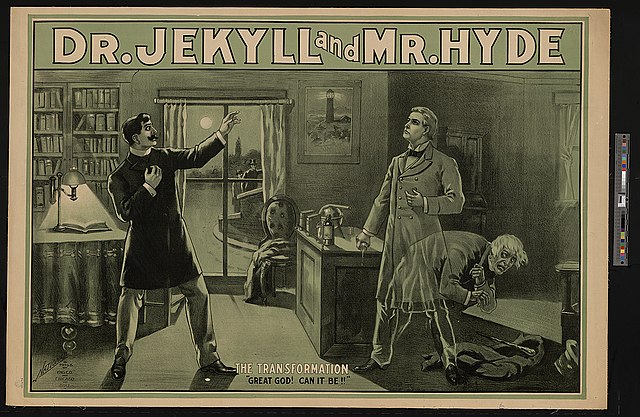The concept of two-facedness is part of many cultures. Sometimes this concept is portrayed as it is in animation when characters have an angel on one shoulder and a demon on the other. Yet, Dr. Jekyll’s case seems to be somewhat different. Although he had “two characters…one was wholly evil, the other was still Henry Jekyll ”. In other words, it seems Jekyll does not want to take responsibility for the actions that his body committed when it sported a different facade. Even if we take Hyde’s claim that he was not in control of his actions as truth, we are faced with the fact that there was only one creator of the drug. That man was not Hyde. Jekyll’s “beloved daydream” as he wrote in his statement was “the thought of the separation of these elements,” good and evil. This at least implies a byproduct that is evil, “two separate entities”. This separation assumes not only personal characteristics such as good and evil can be, and even somewhat removed, innate to an individual. In other words they are qualities that can and should be manipulated. Jekyll’s process of Hyde-zation is similar to a product in quality control as Elizabeth Dunn describes no longer (Jekyll) a product. Jekyll is now “broken down into a multitude of qualities, each of which can be measured and recorded” (98 Dunn). Jekyll’s beloved daydream can be seen as a search for quality. Jekyll is the epitome of Dunn’s privatized individual rather than changing the world to resolve his issues Jekyll “acts upon the world by transforming the self (126 Dunn). It’s safe to say that Victorian Britain sucked, between the depravity of the industrial revolution, imperialism, and no functioning Roman Baths. The poor died, or worse lived to work precariously, while the rich were far too similar to Scrooge McDuck. Yet, it was no great joy to be rich in a society with a rigid social code. This society is a byproduct of etiquette and hierarchy, or a quasi-quality control, that can “differentiate” between people “by breaking them down into minute qualities (virtues and sins) to categories them (103 Dunn).” Precisely because of this process of quality control Jekyll can describe the assault of a commoner child as an “accident, as it brought no consequence”. Within the same letter Jekyll states that “no man morally sane could have been guilty of the crime upon so pitiful a provocation”. Not only does this show that Jekyll is not of purely good it how it demonstrates Jekyll’s willing participation in a process that naturalized inhumanity. Precisely because Jekyll to his society is the opposite of Zizek’s Slovene, unworthy and analyzable (8 Zizek), he is a highly cultured man do we care of his murder. His great tragedy is that he feels bad for murdering an MP, after taking a drug he created. Even if Hyde is his evil side even as Jekyll there a glimpses that he enjoys Hyde’s immorality. Does this pray tell mean that all that is stopping Jekyll from beating children and murdering Parliament society’s prohibition? Jekyll reminds us over and over that “It was Hyde, after all, and Hyde alone, that was guilty”. Must he be reminded that he is Hyde? There is no way to Jekyll can simply “undo the evil done by Hyde” without taking responsibility for the direct consequences of his actions. Jekyll sees the construction of Hyde as a process that went awry. He does not question the efficacy of separating his good and evil. He does not even understand that he was defined what good and evil meant. Through his process of constructing Hyde Jekyll similarly to operations management and other business ideology “conceptually isolates” himself “by virtue of “definitions (25 Miranda)” which abstract this” Hyde “or bit of reality from its social and historical context.” In other word’s Hyde’s depravity to Jekyll at least until he had no more drugs, had not barring on his morality. Apparently his actions in depravity, or to use an unrelated term Jekyll’s externalizes, are as his characterization of assaulting a child an accident. As long as Jekyll pays for Hyde’s fees it is of no consequence.
Dunn, Elizabeth C. 2004. Privatizing Poland: Baby Food, Big Business, and the Remaking of Labor. Culture and Society after Socialism. Ithaca: Cornell University Press. Miranda, José Porfirio. 1982. Marx and the Bible: A Critique of the Philosophy of Oppression. Maryknoll, NY: Orbis Books. Stevenson, Robert Louis. 1991. The Strange Case of Dr. Jekyll and Mr. Hyde. Dover Thrift Editions. New York: Dover Publications. Žižek, Slavoj. 1991. For They Know Not What They Do: Enjoyment as a Political Factor. Phronesis. London ; New York: Verso.

Leave a Reply